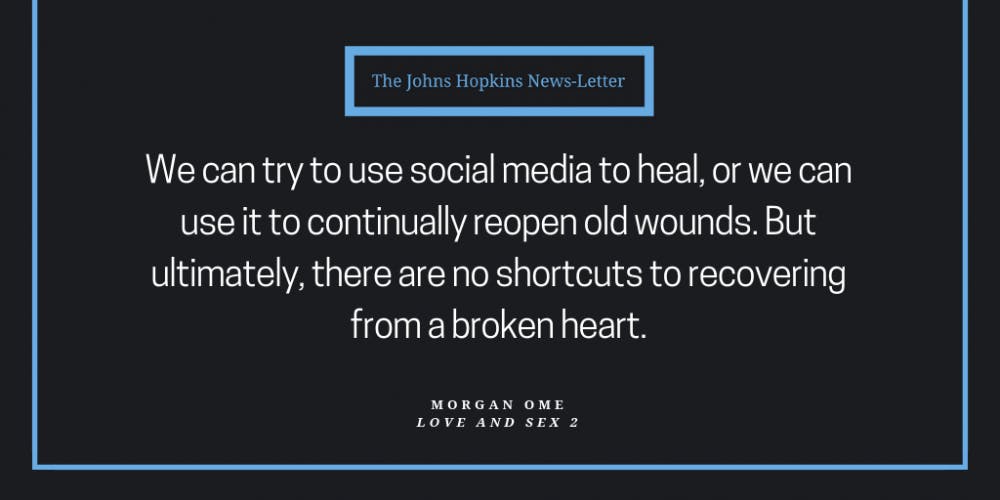Each morning, a Facebook notification arrives at the same time with the same message: “On this day, you have memories with…” That’s usually accompanied by a list of seven people, five of whom I don’t talk to anymore.
The other day, instead of dismissing the notification, I opened it and started scrolling through the photos and posts of past-me. I paused at one picture from my senior year of high school. Captured in the unflattering orange light of a grainy iPhone camera, I am standing next to my high school boyfriend, beaming. Both of us have bad acne and are wearing aprons made of floral print fabric, holding a tray of biscotti that we have just baked.
I smiled at 17-year-old me because she looked happy and in love. My high school boyfriend and I don’t keep in touch anymore, but seeing the photo made me feel a surge of fondness. I was reminded of senior prom and singing to Bruno Mars in the car, of early morning marching band practices and riding bikes by the San Francisco Bay. And I was grateful to Facebook for starting my day with a reminder of all of these things.
For the recently broken-up, however, Facebook is possibly the least helpful remedy for the sting of heartache. There’s no doubt that social media can exacerbate the longing and hurt that comes after the end of a relationship. After my high school boyfriend and I broke up, I moved across the country to Hopkins, and thought that the geographic distance between us would help me move on. But then, I would be sitting down for breakfast in the FFC, see my ex’s latest Instagram post and subsequently start crying over my plate of waffles.
I’m not saying that social media is inherently unhelpful for people going through breakups. In the last few years, Facebook has developed features to help with this process. A team of researchers – known as the Compassion Team – work to make the platform more user-friendly for people going through breakups. For example, you can “take a break” from someone without unfriending or blocking them. You can also hit a button to untag all posts and photos that you’re tagged in so that you don’t need to manually remove yourself from your ex’s social media presence. These technologies are supposed to soothe the broken-hearted and ensure that their emotional stability won’t be compromised by a surprise post in their newsfeed.
As I was going through my first breakup, many of my new friends told me to unfollow, unfriend and block my ex, but I didn’t want to seem like I was being overly dramatic. That wasn’t what a chill person would do. So I let time pass, tried (and failed) to resist the urge to check his profile and slowly stopped thinking about him.
During my sophomore year, I started dating someone new. Neither of us was concerned with documenting our relationship online, and it never bothered me that there really was no digital record of us together. We existed in the real world, and that was much more important.
We broke up last year and one of the biggest reliefs was that I didn’t have to worry about erasing our social media presence. No changing my relationship status. No deleting Instagram posts. No “On this day” notifications.
But what I wasn’t prepared for was running into him daily in the library, or seeing him at our mutual friend’s birthday party. Unlike my first relationship, I didn’t have the luxury of being in a completely separate space (or state). It was much harder to block someone in real life. I tried to take longer routes to class and spend my nights at home, but we would inevitably cross paths at least a few times a week. Hopkins may be a “mid-sized institution,” but when you’re trying to avoid someone, it certainly feels small.
I thought that by avoiding a social media breakup, I would feel better. But instead, I had to confront him in real life, and that was equally, if not more, difficult. We can try to use social media to heal, or we can use it to continually reopen old wounds. But ultimately, there are no shortcuts to recovering from a broken heart. Whether online, or in person, time and space – cliche, I know – are the only two cures that have any chance of working.
In the meantime, watch Great British Bake Off with a group of friends; spend some time reflecting and journaling; dance until midnight at The Crown. Do things that will soothe and comfort yourself. And if you feel like you need to, block your ex on Facebook. Just don’t be afraid to document your relationship while it’s happening. When your heart has healed, looking back on your relationship can remind you of all that love has to offer.





